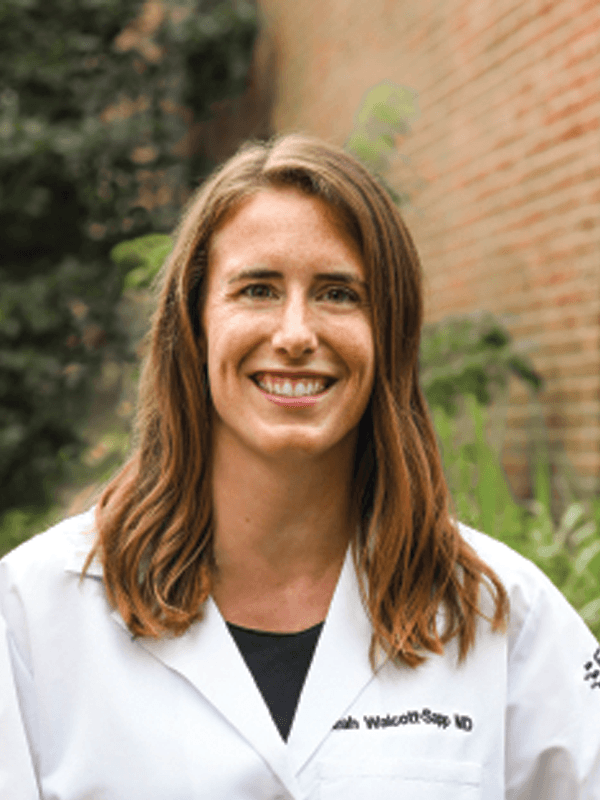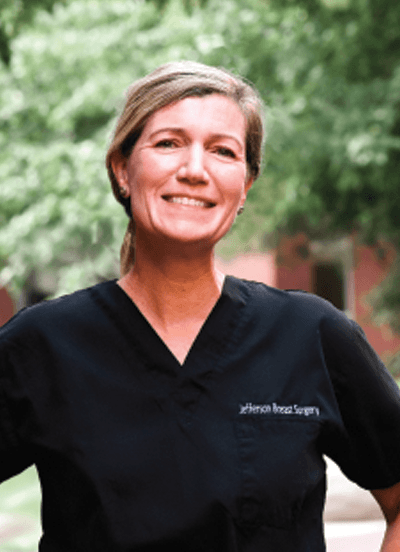

These experts are paving the way in breast cancer detection, prevention and treatment.

Breast Surgical Oncologist
Einstein Medical Center Philadelphia
What led you to a career in breast surgery? During my surgical residency, I became interested in the multidisci-plinary nature of oncology—the fact that you work with a wide variety of other specialists. I was considering pursuing thoracic oncology, but then I had the chance to work in breast surgery. I really liked the long-term relationships breast surgeons form with their patients. I also liked that the diagnostic technology and treatment options for breast cancer seemed far ahead of other cancers. It’s a field that is at the forefront of cancer research. It’s also a field that has very good long-term outcomes—the vast majority of patients diagnosed with breast cancer will survive it.
What is new in breast cancer surgery? There is a trend toward doing smaller procedures to remove the cancer rather than the full breast. Our main focus is to remove the cancer, of course, but we’re finding we can still accomplish that while also considering aesthetics. It can be as simple as planning incisions to hide scars and filling in an area to maintain more normal breast shape. We’re also removing less lymph nodes, which greatly decreases a patient’s chance of developing problems like lymphedema after surgery or later in life. These less-invasive surgeries can be just as successful as complete mastectomies and have huge benefits for a patient’s quality of life.
What is special about the breast surgery legacy at Einstein? Beginning with Dr. Robert Somers decades ago, Einstein has traditionally had very well-established and well-respected breast surgery and breast cancer screening programs. We uphold that tradition today. Through our HealthyWoman program, which is funded by the Pennsylvania Department of Health, women without insurance can get free screening mammograms and have access to a weekly clinic if there are abnormalities on their scans. If they require surgery, we have a nurse navigator who works with them to get insurance coverage. A favorite part of my job is being able to treat these patients who wouldn’t otherwise have access to care.
How has COVID-19 affected breast surgery and what has your team done to adjust? Even during a pandemic, patients are still getting breast cancer. and we have an obligation to help them. Fortunately, we have put many safety measures in place so that we can continue seeing and treating our patients and scheduling surgeries. Decisions on who needs to come into the hospital and who can be rescheduled or seen using telehealth are made on a case-by-case basis. We are always weighing the risk of bringing patients into the hospital versus the risk of them waiting for treatment.

Breast Surgical Oncologist & Enterprise Director of Breast Oncology
Jefferson Health
You’re the Enterprise Director of Breast Oncology. What does that mean? Jefferson Health has many sites offering breast cancer screenings and treatments—from Philadelphia to South Jersey. Each location is a little different and serves a unique patient population, but they all have talented physicians and staff and offer advanced screening and surgeries, breast reconstruction, clinical trials and other sophisticated procedures to the community. My job is to oversee the entire breast oncology program and ensure that all these sites are providing consistent, world-class services.
What is a new innovations in breast cancer care? We now know that women with certain tumors will benefit from chemo-therapy before surgery. It’s called neoadjuvant chemotherapy. In some cases, patients have a complete response and there is no visible tumor remaining. In other patients, the chemotherapy shrinks the tumor. Both sce-narios can potentially lead to less extensive surgery with better cosmetic results.
Why is it important to know your patients personally? Getting to know a patient’s goals and concerns is essential for guiding their treatment and helping them make the best decisions. I also need to know the barriers or challenges they may face. Do they have transportation to and from their appointments? When do they need to return to work? Will they have childcare during their recovery? Knowing my patients personally allows me to better care for them.
Talk about dense breasts. What does that mean? About 20 percent of women have extremely dense breast tissue, which can make finding cancer difficult with standard mammography. At Jefferson, we’re piloting a Dense Breast Clinic that provides tailored imaging for these women. Three dimensional mammography is one option, but we also offer breast MRI, automated whole breast ultrasound, and contrast-enhanced mammography. We recently launched a clinical trial for contrast-enhanced mammography, which is a technique few hospitals offer.
What is one question you wish more women would ask you? I wish more women would ask about what life is like after breast cancer. Some women make very quick decisions about their treatment in the heat of diagnosis. They think they’re going to die so they feel they need to take drastic measures like a complete mastectomy. But part of my job is to help women recognize what life will be like after cancer— the long-term effects of decisions they will make today. It’s important they understand the timeline of treatment and that recovery doesn’t happen the day after surgery. Psychological recovery takes time. This kind of conversation gives them hope and insight about their future and helps them make informed decisions about their care.